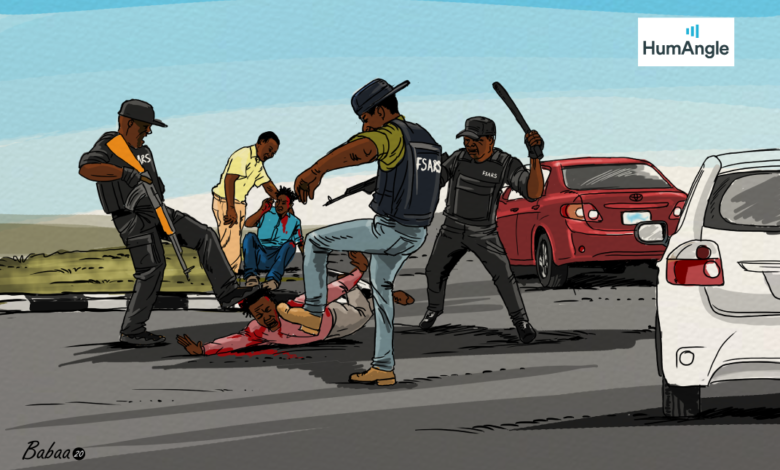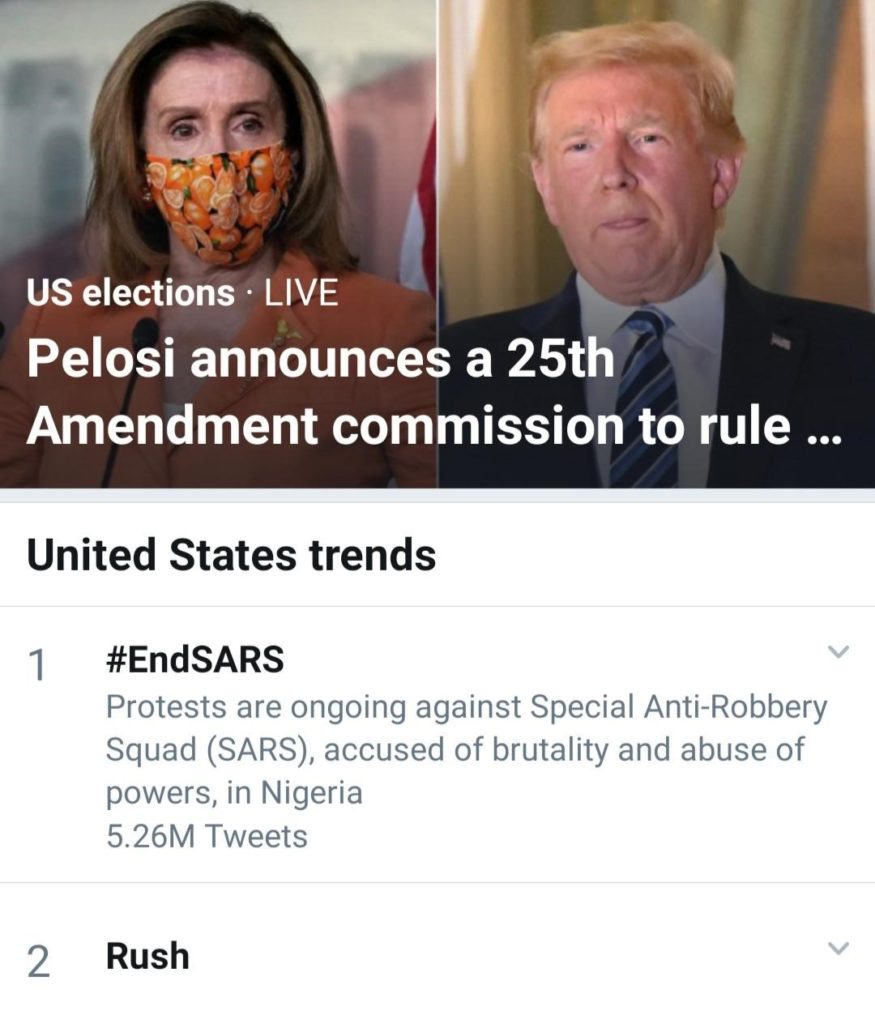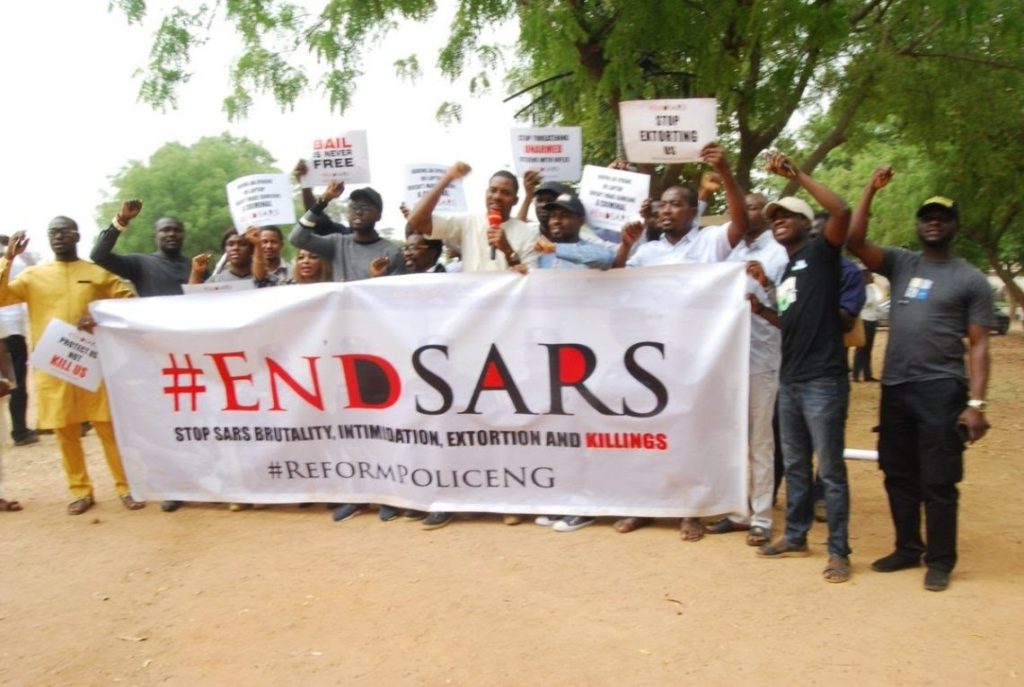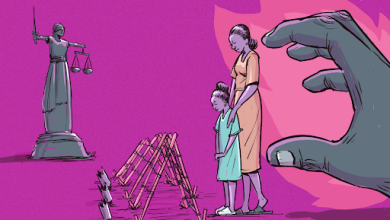Reporter’s Diary: #EndSARS Could Be The Gateway To True Police Reform

A few years ago, I was shocked to see a man in casual wear in hot pursuit of a young man, discharge a bullet from his Kalashnikov rifle.
He did not have the appearance of a law enforcement officer but looked more like a non-state actor with an assault rifle, worn-out shoes and red eyes.
Over the years, it has become normal to see police officers, with similar appearances, hunt down, harass and brutalise Nigerian youths. The people have reacted out of strain. This time, with unflinching energy.
On October 8, a group of young Nigerians camped overnight outside the state House of Assembly of Nigeria’s commercial capital, Lagos and live-streamed their engagement with the House Speaker Mudashiru Obasa in the early hours of Friday, October 9.
The protesters were demanding an end to the Nigerian police SARS ( Special Anti-Robbery Squad), a squad notorious for moving around in casual wears, unmarked cars and conducting extrajudicial killings, detention and brutality.
On Friday, more people staged a protest in multiple cities across the country and on the popular micro-blogging site Twitter, the #ENDSARS hashtag crossed over 5 million tweets, trended worldwide and stayed on the top trends in the United States for some time.

Young Nigerians are overwhelmed with fears of ending up as the next victims of police brutality and angry with the Government for not showing empathy and acting quickly to scrap and conduct a full investigation into operations of these tactical squads and units under the Force Criminal Investigation and Intelligence Department.
As a reporter for HumAngle, I saw first-hand the aftermath of the struggle protesters had with the police in Abuja on Friday.
Like their counterparts all over the country, Abuja youths came out to the city centre to protest but were dispersed with tear gas and gunshots by the same police force they were protesting against.
My phone got damaged in the midst of the snafu – a minor incident that occurred as I tried to document scenes for my report.
The disruption in Abuja regardless, the #EndSARS movement has gained massive momentum and is slowly getting international support.
The people are not crying wolf. Instead, they are passionately calling for the disengagement of a police unit that was originally intended to protect but is now responsible for several wrongful deaths and harassments.
Amnesty International in a June report, Time to End Impunity, documented at least 82 cases of torture, ill-treatment and extra-judicial execution by SARS between January 2017 and May 2020.
Amnesty also revealed that a bulk of the victims documented are males between the ages of 18 and 35, from low-income backgrounds and vulnerable groups.
“Young people between the ages of 17 and 30 are most at risk of arrest, torture or extortion by SARS. They are often accused of being internet fraudsters and/or armed robbers. Young men with dreadlocks, ripped jeans, tattoos, flashy cars or expensive gadgets are frequently targeted by SARS,” Amnesty stated.
This report highlights why young people are outraged by the impunity with which SARS perpetrates horrific human rights violations despite the anti-torture legislation passed in 2017 and repeated promises by governments to reform the Nigerian Police Force and overhauling of the SARS announced by the Inspector General of Police on August 14, 2018.
SARS, a symptom of a disease
SARS and other tactical units of the police were created in response to diverse threats, which shapes their modus operandi.
SARS was the squad designated with the responsibility of curbing incidents of violent crimes such as armed robbery and kidnapping.
Officers of this unit were supposed to act with near visibility to tackle the menace, some have paid the ultimate sacrifice in the line of duty and Borno, the epicentre of Boko Haram conflict, SARS is a vital component of the campaign against Boko Haram.
However, the name of the squad brings shivers down the spine of most people because of their problematic, corrupt and brutal profiling, tactics and technique.
These factors and the lack of commitment by the Government and the police to scrap SARS provide a good mirror into the problems behind the inefficient policing in the country and deteriorating public trust.
The root of the problem could be traced back to a policing culture and tactics influenced by the mindset and purpose of the police at its inception, as a tool of the Royal Niger Company and British colonial government to protect the exploitation of resources and suppress dissent with overwhelming force.
Other factors include training regime, working and living conditions of officers, oversight and transparency, as well as lack of inadequate technological support systems to ease processes and procedures.
These factors mutually reinforce each other to produce officers with insufficient mental and operational capacity to manage their assignments and the stress associated with it.
Obsolete and brutal tactics of profiling, detaining processing and operations have also become the hallmarks of their squads.
Killing Two Birds With One Stone
Scrapping SARS could be an opportunity to implement badly needed police reforms through executive actions and implementation of provisions of the new Nigeria Police act and Trust fund.
A public inquiry is critical to winning hearts and regaining public trust in the police.
At the same time, an independent investigation is required to ascertain the medical conditions of officers and involvement in acts that contravene statutory laws such as the anti-torture act 2017.
Rehabilitation and reintegration of officers without indictments into other support sections of the police should be the next phase, while officers involved in human rights violations face civil and criminal justice.
Given the multiplicity of factors responsible for the crisis, reviewing the standard operating procedures and conditions of service of the police is important to enhance the proficiency of officers and effectiveness of the police to manage and nip security threats in the bud, as well as build a new policing culture that relies less on hypervigilance and excessive use of force but more on policing with communities and respecting the rights Nigerians.
The establishment of a professional and proficient tactical unit to address violent crimes in the country is possible with the right reforms and programs.
Support Our Journalism
There are millions of ordinary people affected by conflict in Africa whose stories are missing in the mainstream media. HumAngle is determined to tell those challenging and under-reported stories, hoping that the people impacted by these conflicts will find the safety and security they deserve.
To ensure that we continue to provide public service coverage, we have a small favour to ask you. We want you to be part of our journalistic endeavour by contributing a token to us.
Your donation will further promote a robust, free, and independent media.
Donate HereStay Closer To The Stories That Matter





